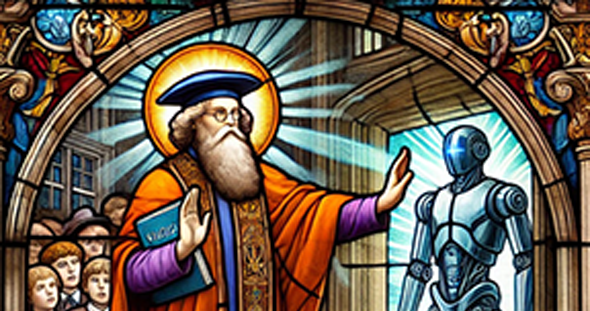The Resistance to AI in Education isn’t Really about Learning

🌈 Abstract
The article discusses the impact of generative AI on the education industry, particularly in the context of the COVID-19 pandemic. It explores the resistance to AI in education, arguing that it reflects a reluctance to re-evaluate the traditional roles of educators and embrace the opportunities AI offers to enhance the learning experience. The article also highlights the need for the teaching profession to confront some "comforting myths and uncomfortable truths" in order to thrive in the age of AI.
🙋 Q&A
[01] The AI in Education Counter-Reformation
1. What are the key arguments against the use of AI in education, as presented in the article?
- The main argument is that meaningful learning requires a skilled and caring human intermediary between the learner and the subject, a belief the article calls "instructor essentialism".
- There are concerns about AI having access to student writing and potentially exploiting the students' intellectual property.
- Some educators view the use of AI as unethical and as a threat to academic integrity and the teaching profession.
2. How does the author respond to these arguments?
- The author argues that using AI to provide rapid feedback to students can increase the speed and quality of feedback, which is critical for impactful learning.
- The author contends that concerns about student work being stored in AI databases are not significantly different from the long-standing practice of uploading student work into plagiarism detection databases.
- The author suggests that the resistance to AI in education is not truly about learning, but rather reflects a reluctance to re-evaluate the traditional roles of educators and embrace the opportunities AI offers.
[02] Problem #1: The Belief in Instructor Essentialism
1. What is the "instructor essentialism" belief, and how does the article challenge it?
- Instructor essentialism is the belief that almost all learners require the assistance of a human expert to guide them in order to achieve deep learning and mastery of any subject.
- The article argues that this belief is a "core belief" of teachers, reinforced by romanticized portrayals of the teacher-student relationship in popular culture.
- However, the article contends that the true essential ingredient of effective learning is the learner's own actions, and that teachers can only add value to the learning experience, but are not an absolute necessity.
2. How does the article distinguish between learning and schooling?
- The article suggests that the conflation of schooling with learning has contributed to the emergence of instructor essentialism.
- It argues that one of the primary functions of schools is to supervise young children and adolescents while their parents are at work, which is distinct from the actual process of learning.
- The article draws a parallel to the investment industry's experience with the introduction of index fund investing, which was initially resisted by professionals who insisted that serious investing required their expertise.
[03] Problem #2: The Closed World of Academic Culture
1. How does the article characterize the academic culture of teachers?
- The article suggests that many teachers, especially college instructors, have spent little time working in non-academic professions, which heightens their anxiety about the potential impact of generative AI on their work.
- It also notes that the special protections afforded by academia, such as tenure and academic freedom, have often allowed teachers to resist pressures to transform their practices, insulating them from the frequent changes required of other professions.
2. What does the article suggest as a way forward for the teaching profession in the age of AI?
- The article proposes that faculty need to critically reexamine their assumptions about their roles and recognize the possibilities inherent for education in the world of AI.
- It suggests several ways in which AI can be leveraged as a "force multiplier" for formative assessment, create a variety of powerful learning tools, accelerate the adoption of the science of learning, and increase opportunities for social learning.
- The article argues that AI does not eliminate the need for teachers, but can bring about the end of an outdated, lecture-based model of teaching and potentially usher in a "golden age of learning".